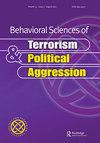Testing the link between conspiracy theories and violent extremism: a linguistic coding approach to far-right shooter manifestos
IF 1.4
Q2 POLITICAL SCIENCE
Behavioral Sciences of Terrorism and Political Aggression
Pub Date : 2023-10-05
DOI:10.1080/19434472.2023.2258952
引用次数: 0
Abstract
ABSTRACTConspiracy theories have been linked to violent extremist attacks, creating a view that holding one may be a motivating factor for engaging in violence. The perpetrators of the 2019 Christchurch, Poway, and El Paso shootings each cited the ‘Great Replacement’ white genocide conspiracy theory in manifestos distributed online prior to the attacks. This research conducts a close reading of these manifestos and the original conspiracy theory to test the link between holding a conspiracy theory and engaging in outgroup-oriented violence. It compares Renaud Camus’ Great Replacement text (You Will Not Replace Us) and the manifestos of the three violent extremists that cite this theory (The Great Replacement, The Inconvenient Truth, An Open Letter). Three theoretical frameworks provide the basis for the analysis: (1) The presence of conspiracy theory elements (agency, coalition, threat, secrecy), (2) radical narrative constructs (crisis, solution, justification), and (3) mobilising emotions (anger, contempt, disgust – ANCODI). All four sources contained the elements of a conspiracy theory, crisis narratives, and mobilising ANCODI emotions as the dominant emotions. This suggests that the original conspiracy theory may have influenced the perpetrators. This research furthers academic debate, both conceptually and empirically, about the nature of connectivity between conspiracy theories and violent extremism. AcknowledgementThe authors would like to thank the external coders, in particular Ms Jacqueline Albert, for their valuable assistance with the coding process.Disclosure statementNo potential conflict of interest was reported by the author(s).Notes1 R v Brenton Harrison Tarrant sentencing remarks, High Court of New Zealand, (2020).2 R. Sanchez & S. Chan, ‘California synagogue shooter sentenced to life in prison without the possibility of parole’, CNN News, (30 September 2021).3 A. Martinez & D. Borunda, ‘What we know about the trial of suspected El Paso Walmart shooter Patrick Crusius’, El Paso Times, (4 August 2021).4 Based on Baele’s four nefarious archetypal actors present in conspiratorial narratives. See Baele (Citation2019, p. 711).Additional informationNotes on contributorsJana VanderweeMs. Jana Vanderwee has a background in Australian law enforcement. She completed her Master of Research in terrorism studies at the Department of Security Studies and Criminology, Macquarie University.Julian DrooganDr. Julian Droogan is Associate Professor of terrorism studies at the Department of Security Studies and Criminology, Macquarie University. He serves as Director of Research and Innovation, and as Editor for the Journal of Policing, Intelligence, and Counter Terrorism.测试阴谋论和暴力极端主义之间的联系:对极右翼枪手宣言的语言编码方法
摘要阴谋论一直与暴力极端主义袭击联系在一起,产生了一种观点,认为持有一个阴谋论可能是参与暴力的一个激励因素。2019年克赖斯特彻奇、波威和埃尔帕索枪击案的肇事者在袭击前在网上发布的宣言中都引用了“大替代”白人种族灭绝阴谋论。本研究对这些宣言和最初的阴谋论进行了仔细的阅读,以测试持有阴谋论与参与外群体导向暴力之间的联系。它比较了雷诺·加缪的《伟大的替代》文本(你不会取代我们)和引用这一理论的三个暴力极端主义者的宣言(《伟大的替代》、《难以忽视的真相》、《一封公开信》)。三个理论框架为分析提供了基础:(1)阴谋论元素(代理,联盟,威胁,秘密)的存在,(2)激进的叙事结构(危机,解决方案,辩护),以及(3)调动情绪(愤怒,蔑视,厌恶- ANCODI)。所有四种来源都包含阴谋论、危机叙事和动员ANCODI情绪作为主导情绪的元素。这表明最初的阴谋论可能影响了肇事者。这项研究在概念上和经验上都进一步推动了关于阴谋论和暴力极端主义之间联系本质的学术辩论。作者要感谢外部编码员,特别是Jacqueline Albert女士,她在编码过程中提供了宝贵的帮助。披露声明作者未报告潜在的利益冲突。注1 R诉Brenton Harrison Tarrant案,新西兰高等法院,(2020)2 . R. Sanchez和S. Chan,“加州犹太教堂枪手被判终身监禁,不得假释”,CNN新闻,(2021年9月30日)一个。马丁内斯和D. Borunda,“我们对埃尔帕索沃尔玛枪击案嫌疑人帕特里克·克鲁修斯审判的了解”,埃尔帕索时报,(2021年8月4日)基于贝尔的四个邪恶的原型演员出现在阴谋叙事。参见Baele (Citation2019,第711页)。关于贡献者的说明jana VanderweeMs。Jana Vanderwee有澳大利亚执法背景。她在麦考瑞大学安全研究与犯罪学系完成了恐怖主义研究硕士学位。朱利安DrooganDr。朱利安·德鲁根(Julian Droogan)是麦考瑞大学安全研究与犯罪学系恐怖主义研究副教授。他担任研究和创新总监,并担任警务,情报和反恐杂志的编辑。
本文章由计算机程序翻译,如有差异,请以英文原文为准。
求助全文
约1分钟内获得全文
求助全文
来源期刊

Behavioral Sciences of Terrorism and Political Aggression
POLITICAL SCIENCE-
CiteScore
4.80
自引率
10.00%
发文量
27
 求助内容:
求助内容: 应助结果提醒方式:
应助结果提醒方式:


